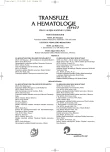-
Medical journals
- Career
B-cell chronic lymphocytic leukemia Part II: Diagnostic criteria and the importance of individual patient’s prognosis assessment
Authors: T. Papajík; M. Jarošová; Z. Pikalová; K. Indrák
Authors‘ workplace: Hemato-onkologická klinika FN a LF UP v Olomouci
Published in: Transfuze Hematol. dnes,12, 2006, No. 3, p. 132-139.
Category: Comprehensive Reports, Original Papers, Case Reports
Overview
B-cell chronic lymphocytic leukemia (B-CLL) represents most common leukemia in Western Europe and North America adult population. Accurate diagnosis of the disease based on leukemic cell immunophenotype analysis has principal importance in differential diagnostic distinction of B-CLL from other leukemized B-cell malignancies. Determination of strong and independent prognostic parameters in early and intermediate disease stage patients could lead to consideration of appropriate therapeutic approach. Assessment of IgVH mutational status, ZAP70 and CD38 expression levels, genetic aberrations and p53 gene mutations constitute modern tools for understanding of biologic behavior and potential aggressiveness of leukemic clone.
Key words:
B-cell chronic lymphocytic leukemia, diagnosis, immunocytology, cytogenetic, IgVH mutations, prognosis
Labels
Haematology Internal medicine Clinical oncology
Article was published inTransfusion and Haematology Today

2006 Issue 3-
All articles in this issue
- B-cell chronic lymphocytic leukemia Part II: Diagnostic criteria and the importance of individual patient’s prognosis assessment
- New approaches to diagnosis and treatment of iron overload
- Splenectomy in diagnostics and treatment of hematological disorders: A single-center indications, complications and results
- Impact of preparative regimen and haematopoietic stem cell transplantation on circulating markers of cardiac damage
- Evaluation of apoptotic markers and platelet activation in apheretic harvests from plasma
- Plasma concentrations of cytokines and co-stimulatory molecules (interleukins IL-2, IL-4, IL-5, IL-6, IL-8, IL-10, IL-13, TNF-α, TGFβ1, sCD23, sCD40L and IL-6 receptor) in healthy blood donors
- The standardization of a biochemical laboratory determination of multiple myeloma
- Transfusion and Haematology Today
- Journal archive
- Current issue
- Online only
- About the journal
Most read in this issue- Splenectomy in diagnostics and treatment of hematological disorders: A single-center indications, complications and results
- Plasma concentrations of cytokines and co-stimulatory molecules (interleukins IL-2, IL-4, IL-5, IL-6, IL-8, IL-10, IL-13, TNF-α, TGFβ1, sCD23, sCD40L and IL-6 receptor) in healthy blood donors
- The standardization of a biochemical laboratory determination of multiple myeloma
- New approaches to diagnosis and treatment of iron overload
Login#ADS_BOTTOM_SCRIPTS#Forgotten passwordEnter the email address that you registered with. We will send you instructions on how to set a new password.
- Career

